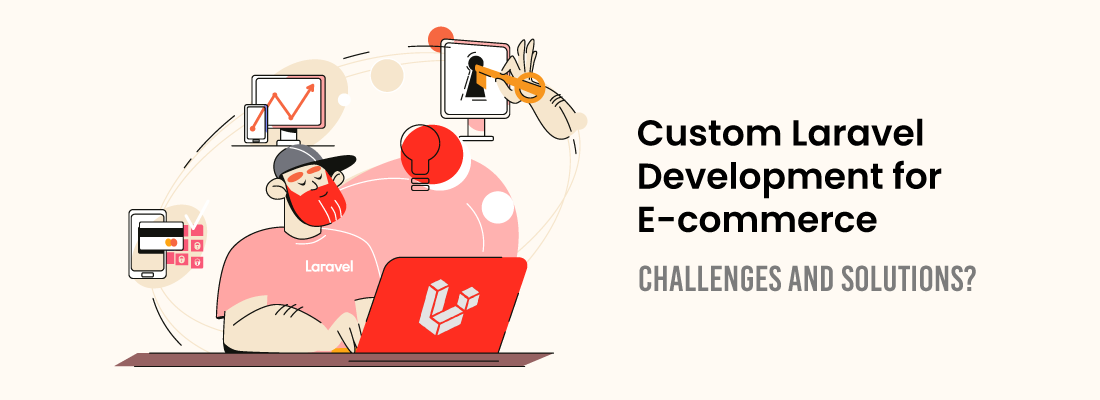Custom laravel development for E-commerce: Challenges and Solutions

E-commerce has recently emerged as one of the sectors with the quickest rate of growth, and companies are always seeking ways to enhance their online presence and stay one step ahead of the competition.
Due to its powerful features and simplicity of use, Laravel, a prominent PHP web application framework, has grown significantly in popularity among developers. Businesses can benefit from a scalable, dependable, and feature-rich platform to sell their goods and services online with the help of custom Laravel development.
However, there are a number of difficulties that firms could run into during the development process, just like with any bespoke development project.
We'll look at some of the typical difficulties that companies encounter when developing bespoke Laravel e-commerce websites in this blog post, as well as some potential solutions.
In order to assist businesses in achieving their e-commerce objectives with Laravel, we will cover a variety of
Custom laravel development subjects, from assuring scalability and security to integrating payment methods and optimising website speed.
Custom Laravel Development for E-commerce Challenges
Scalability:
Assuring scalability during custom Laravel development for e-commerce is one of the main problems firms encounter. The website needs to be able to manage more traffic and sales as the firm expands. The built-in support for caching, load balancing, and database clustering in Laravel can help developers overcome this obstacle and increase the speed and scalability of their websites.
Security:
E-commerce websites handle sensitive client data, such as payment and personal information. Therefore, security is a top priority while creating custom Laravel applications. Developers can use features like safe password hashing, two-factor authentication, and encryption for critical data to ensure security. Regular security updates and audits can also aid in keeping the website safe.
Payment gateway integration:
Developers must be familiar with each gateway's API in detail in order to integrate payment gateways with an e-commerce website. Different
payment gateways are supported by Laravel, and developers can use these connectors to streamline the procedure. Developers can also leverage Laravel's validation and error-handling tools to guarantee mistake-free transactions.
Optimization:
A successful e-commerce website depends on the speed and performance of its website. Developers can utilize strategies like caching, lazy loading, and database indexing to improve the performance of websites. They can also utilize programmes like Laravel Debugbar and Blackfire.io to find and fix performance problems.
User experience:
E-commerce websites must offer a seamless user experience. The development of a responsive and user-friendly design, the implementation of quick checkout procedures, and the provision of clear and simple product information can all help to enhance the user experience. In order to enhance the user experience overall and add new features, developers can use Laravel's support for third-party packages and extensions.
Custom laravel development for E-commerce Possible solutions
● Using Laravel's integrated support for caching, load balancing, and database clustering, developers can ensure scalability and enhance website speed. Additionally, they can simply scale the website as needed by using cloud hosting services like Amazon Web Services (AWS) or Microsoft Azure.
● Developers can use features like safe password hashing, two-factor authentication, and encryption for critical data to ensure security. Regular security updates and audits can also aid in keeping the website safe. Website security can be improved by developers using third-party security tools like Sucuri and Cloudflare.
● Laravel's support for a number of payment gateways can be used by developers to streamline the integration procedure. They can also make advantage of Laravel's validation and error handling tools to guarantee error-free transactions. They can also employ third-party payment gateway integration solutions, like Stripe and PayPal, to speed up the procedure.
● To improve the performance of websites, developers might employ strategies like caching, lazy loading, and database indexing. In order to find and fix performance problems, users can also use tools like Blackfire.io and Laravel Debugbar. Utilising content delivery networks (CDNs) and minifying resources like CSS and JavaScript will help websites load faster.
Frequently Asked Questions
What is Laravel?
Laravel is a free, open-source PHP web application framework used for web development. It provides a range of features and tools to make web development faster and easier. Laravel is popular among developers due to its robust features and ease of use.
What are the benefits of using Laravel for e-commerce development?
Laravel provides various benefits for e-commerce development, such as easy integration with payment gateways, support for multiple databases, built-in authentication, and authorization features, and robust security features.
Final thoughts
In conclusion, custom Laravel development for e-commerce is a complex and challenging process that requires extensive knowledge of the framework and the e-commerce domain. Businesses must carefully plan their custom e-commerce development project and choose the right development team to ensure its success. By adopting these solutions, businesses can build a competitive edge in the e-commerce market and achieve their business goals. For more information, get in touch with Yugasa software Labs
